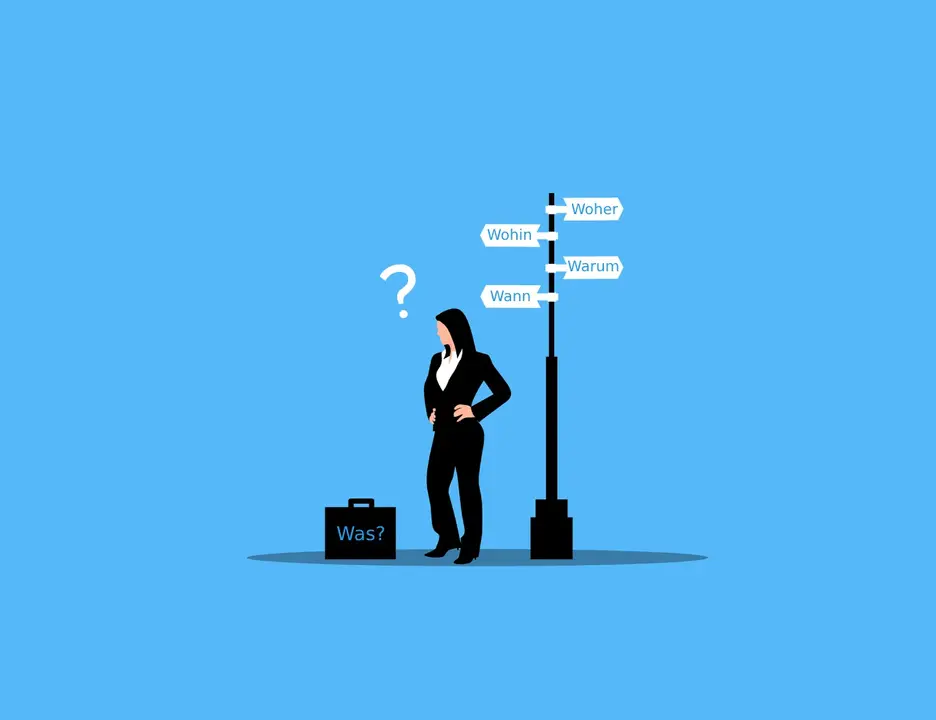It All Starts with a W: How W-Questions Work

W-Fragen are open-ended questions that begin with a German question word starting with "W". Unlike yes-or-no questions, they seek specific information and detailed answers. Similar to the "Five Ws" in English – Who, What, When, Where and Why – W-Fragen play a crucial role in gathering information, crafting news stories, and engaging in meaningful conversations.
What Are W-Fragen?
In German, W-Fragen are interrogative words used to ask open-ended questions. These questions cannot be answered with a simple "yes" or "no". Instead, they require more detailed responses.
Structure of W-Fragen
The basic sentence structure for W-Fragen in German is:
W-Word + Verb + Subject (+ Other Elements)?
Common W-Words
Here are the most common W-Fragen in German:
German | English Translation |
|---|---|
Wer? | Who? |
Was? | What? |
Wann? | When? |
Wo? | Where? |
Warum? | Why? |
Wie? | How? |
Wohin? | Where to? |
Woher? | Where from? |
Wessen? | Whose? |
Welcher? | Which? |
These words are used at the beginning of a sentence to form a question. For example:
Was machst du? – What are you doing?
Warum lernst du Deutsch? – Why are you learning German?
W-Fragen in Journalism
W-Fragen aren’t just useful in language learning – they are also the backbone of effective journalism. Reporters use them to ensure they cover all the important aspects of a story. In this context the key W-Fragen include:
Wer? – Who is involved?
Was? – What happened?
Wann? – When did it happen?
Wo? – Where did it happen?
Warum? – Why did it happen?
Wie? – How did it happen?
Together they help provide a complete and objective overview of any event or topic.
Examples of W-Fragen and Their Answers
1. Was machst du? – What are you doing?
Ich lerne Deutsch. – I am learning German.
2. Wo wohnst du? – Where do you live?
Ich wohne in Berlin. – I live in Berlin.
3. Wann beginnt der Unterricht? – When does the class start?
Der Unterricht beginnt um acht Uhr. – The class starts at 8 o'clock.
4. Warum lernst du Deutsch? – Why are you learning German?
Weil ich in Deutschland arbeiten möchte. – Because I want to work in Germany.
5. Wie heißt du? – What’s your name?
Ich heiße Anna. – My name is Anna.
Tips for Answering W-Fragen
Use full sentences when possible.
Repeat part of the question in your answer (especially in writing).
Be specific and clear.
Use correct verb conjugation based on the subject.
📝 Exercises
Exercise 1: Match the Question to the Correct Answer
Match the W-Frage on the left with the most appropriate answer on the right.
W-Frage | Antwort |
|---|---|
1. Woher kommst du? | A. Ich bin Lehrer. |
2. Was machst du gern? | B. Weil es interessant ist. |
3. Warum lernst du Deutsch? | C. Ich komme aus Spanien. |
4. Wer ist das? | D. Ich spiele gern Fußball. |
5. Was bist du von Beruf? | E. Das ist meine Schwester. |
Write your answers like: 1 – C, 2 – D, etc.
Exercise 2: Fill in the W-Word
Fill in the blank with the correct W-word: wer, was, wann, wo, warum, wie
______ heißt du?
______ wohnst du?
______ kommt er?
______ machst du am Wochenende?
______ lernst du Deutsch?
Exercise 3: Answer the Questions
Write full-sentence answers in German:
Was ist dein Lieblingsessen?
Wo arbeitest du?
Wie alt bist du?
Wann stehst du auf?
Wer ist dein bester Freund/deine beste Freundin?
✅ Answers
Exercise 1: Match the Question to the Correct Answer
W-Frage | Antwort |
1. Woher kommst du? | C. Ich komme aus Spanien. |
2. Was machst du gern? | D. Ich spiele gern Fußball. |
3. Warum lernst du Deutsch? | B. Weil es interessant ist. |
4. Wer ist das? | E. Das ist meine Schwester. |
5. Was bist du von Beruf? | A. Ich bin Lehrer. |
Exercise 2: Fill in the W-Word
Wie heißt du?
Wo wohnst du?
Woher kommt er?
Was machst du am Wochenende?
Warum lernst du Deutsch?
Exercise 3: Sample Answers
Note: Answers may vary! Here are some examples.
Was ist dein Lieblingsessen? → Mein Lieblingsessen ist Pizza.
Wo arbeitest du? → Ich arbeite in einem Büro.
Wie alt bist du? → Ich bin 25 Jahre alt.
Wann stehst du auf? → Ich stehe um sieben Uhr auf.
Wer ist dein bester Freund/deine beste Freundin? → Meine beste Freundin heißt Laura.
Sophia is a certified German language expert (Goethe & telc) with over eight years of experience helping learners master German. She specializes in creating high-quality digital learning materials and writing informative articles, while teaching German and preparing students for exams – bringing practical, real-world language skills to every lesson.